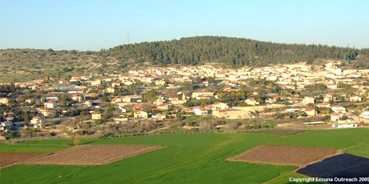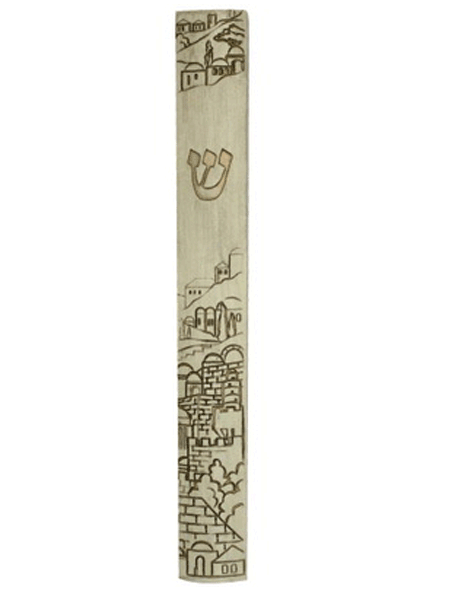
Shlach Lecha: Roam and Board
Are those who live outside of Israel upset when they read about the spies and their rejection of Eretz Yisrael? If not, they might be part of that same sin…

:א וַיְדַבֵּ֥ר יְהֹוָ֖ה אֶל־משֶׁ֥ה לֵּאמֹֽר
ב שְׁלַח לְךָ֣ אֲנָשִׁ֗ים וְיָתֻ֨רוּ֙ אֶת־אֶ֣רֶץ כְּנַ֔עַן אֲשֶׁר־אֲנִ֥י נֹתֵ֖ן לִבְנֵ֣י יִשְׂרָאֵ֑ל אִ֣ישׁ אֶחָד֩ אִ֨ישׁ אֶחָ֜ד לְמַטֵּ֤ה אֲבֹתָיו֙ תִּשְׁלָ֔חוּ כֹּ֖ל נָשִׂ֥יא בָהֶֽם
G-d spoke to Moshe, saying, “Send men and spy out the land of Canaan …” (Bamidbar 13:1-2)
A rabbi, once speaking on this week’s parshah, said that these verses act as a kind of “litmus test” for the Jew in every generation living outside of Eretz Yisroel (he, of course, lived in Eretz Yisroel). He said that, if one is moved to tears each time he reads the story of the spies and their rejection of Eretz Yisroel and of the exile that resulted, then he is part of the rectification of the sin. If, however, one living outside of Eretz Yisroel can read this episode like any other in the Torah, then he himself is still part of the problem.
To what can this be compared? To someone whose money was stolen from him at a certain street corner by a thief, after which his fortunes turned for the worse. Will his heart not sink and will tears not flow every time he passes that corner, until his fortune returns?
The truth is, clearly even a Jew living in Eretz Yisroel not is not “home” yet. The Jewish people remain scattered around the world, the Temple is not yet rebuilt, and the land is filled with disbelievers in Torah, and is led according to secular values. The B’nei Eretz Yisroel should cry this week as well, over the exile that still affects every Jew.
However, it is one thing to grow complacent in chutz l’aretz (outside the Land) and something altogether different to grow complacent in Eretz Yisroel. Those living in Eretz Yisroel are at least “closer” to the Final Redemption than those living outside the land. This is why, as we quoted a few weeks ago, those buried outside Israel are resurrected forty years (corresponding to the years in the desert after the spies’ sin) later than those who were buried in Eretz Yisroel.
 This, perhaps, was part of the message of the Har Sinai Experience. One might have thought that the final destination of the Torah Nation should have been Mt. Sinai. After all, as the Midrash tells us, Mt. Sinai became a virtual paradise when the Divine Presence came down and hovered above the mountain, and gave the Jewish people the Torah. Could there have been no better place to remain than at such a holy place?
This, perhaps, was part of the message of the Har Sinai Experience. One might have thought that the final destination of the Torah Nation should have been Mt. Sinai. After all, as the Midrash tells us, Mt. Sinai became a virtual paradise when the Divine Presence came down and hovered above the mountain, and gave the Jewish people the Torah. Could there have been no better place to remain than at such a holy place?Yet, in spite of the fact that the desert bloomed and Torah flourished there, the Jewish people were still told to move on-on to Eretz Yisroel. On to a place filled with hardship and in need of hard work, as if that too was part of the development of a Torah nation.
However, the generation of the spies wanted to remain in the “desert,” not the one that was barren and dangerous, obviously, but the one that flourished with the blessing of G-d. They seemed to fail to understand that the Divine Providence that had allowed them to grow and develop in the desert was merely a temporary one, one designed to bring them eventually to Eretz Yisroel. The time would eventually come when it would end, and the Jewish people would be left to fend for themselves in the desert, and longing to enter the land.
As the Ba’al HaTurim points out, it is mistake that even great people can make. The last letters of the words “send men” (שְׁלַח לְךָ֣ אֲנָשִׁ֗ים)–ches, chof, mem–spell the word “chacham,” indicating that all of the spies were wise and righteous people. Apparently, even wise and righteous people can err in this judgment and suffer from what has come to be called, a “galut mentality”–a perspective corrupted by exile.
“But isn’t it irresponsible to move to Israel if you don’t have a job lined up first?”
The truth is, the great rabbis of the past didn’t think so, and there is nothing in the Torah to support this idea. In fact, trusting in G-d, something Eretz Yisroel is supposed to be a test of, means living there for the right reasons, and knowing that G-d will take care of you. Having a job lined up first, as a condition of making aliyah, is a recent thing, because the rabbis have seen too many people move back to chutz l’aretz when plans didn’t pan out fast enough. Moving to Eretz Yisroel only to leave it again for negative reasons constitutes a chillul Hashem (profanation of G-d’s Name), because it suggests that G-d can’t take care of His people on His own land.
If so, then maybe the starting point should be to build up enough emunah and bitachon–faith and trust in G-d–as a preparation for living in Eretz Yisroel. Maybe a major part of one’s avodat Hashem (service of G-d) should be developing the spiritual “muscles” that can give one the spiritual and physical stamina to survive the yesurim (difficulties) with which, according to the Talmud, Eretz Yisroel is acquired. Marriage and life in general are stressful enough as it is; without the proper emunah, neither can fare well–anywhere in the world–when the going gets tough, how much more so in a foreign land that lives by miracles.
To begin such a program of spiritual development means to become a little less complacent in the “desert.” It means delving deep into one’s heart of hearts during parshiot (Torah portions) like this week’s, and seeing just how much one is pained by our extended exile, outside and inside the land.
***
Pinchas Winston is the author of over 95 books on various topics that deal with current issues from a traditional Jewish perspective. He has also written on the weekly Torah reading since 1993, called “Perceptions”, as well as on current topics and trends affecting Jewish history, past and present. One of his missions is to make the depth and beauty of the more mystical teachings of Torah understandable and accessible to those who can really benefit from them. Visit his website at thirtysix.org.











Tell us what you think!
Thank you for your comment!
It will be published after approval by the Editor.